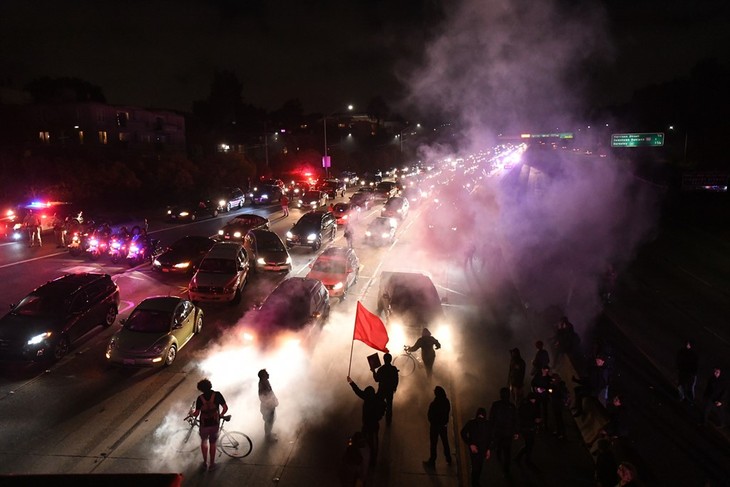
On Wednesday, Republican Gov. Brad Little signed a bill officially banning public schools and colleges from teaching critical race theory — if, that is, such instruction compels students to view Americans through a racial lens.
As reported by The Idaho Statesman, the Senate approved the measure Monday, 27-8.
It had made its way through the House last Thursday to the tune of 57-12.
Per wording of the bill, it intends to “establish provisions regarding dignity and nondiscrimination in public education” and to “prohibit the expenditure of moneys for certain purposes.”
Before reaching the general Senate, the measure passed through the Senate Education Committee, at which point it was opened for public testimony.
Earlier this week, the Statesman noted a backlash:
With backpacks still on and posters in hand, dozens of high school and college students arrived in front of the Idaho Capitol Monday afternoon to protest a bill against “critical race theory” that was already set to pass.
One protestor championed completion:
On the Idaho Capitol steps, Yvonne Shen, 13-year-old organizer of the Asian American Pacific Islander Youth Alliance, said being taught the country’s complete history, the good and the bad, is not about “self-hatred.” Rather, it’s an important step to being able to correct those wrongs, Yvonne said.
“Make no mistake, this is self-awareness,” Yvonne said. “If we aren’t able to recognize our own flaws, we will never be able to progress beyond them.”
The demonstration outside the Idaho Capitol drew dozens of students, many of whom rushed to the Statehouse to try to testify against House Bill 377. The hearing was initially scheduled for 3 p.m. but was moved up to 1:30 on Monday. Testimony was cut short to vote on the bill and send it to the Senate floor.
20-year-old Boise State University student Selena Sanchez said she grew up with discrimination because she’s Mexican American.
To her, the bill means to silence minorities.
“This is censorship, she claimed. “We should all be afraid.”
The legislation doesn’t actually define critical race theory. Instead, it prohibits something specific.
From the bill’s introduction:
It is the intent of the legislature that administrators, faculty members, other employees, and students at public schools, including public charter schools and institutions of higher education, respect the dignity of others, acknowledge the right of others to express differing opinions, and foster and defend intellectual honesty, freedom of inquiry and instruction, and freedom of speech and association.
The Idaho legislature finds that tenets outlined in subsection (3)(a) of this section, often found in “critical race theory,” undermine the objectives outlined in subsection (1) of this section and exacerbate and inflame divisions on the basis of sex, race, ethnicity, religion, color, national origin, or other criteria in ways contrary to the unity of the nation and the well-being of the state of Idaho and its citizens.
A bit of brass tacks:
Paragraph A
No public institution of higher education, school district, or public school, including a public charter school, shall direct or otherwise compel students to personally affirm, adopt, or adhere to any of the following tenets:
- That any sex, race, ethnicity, religion, color, or national origin is inherently superior or inferior
- That individuals should be adversely treated on the basis of their sex, race, ethnicity, religion, color, or national origin
- That individuals, by virtue of sex, race, ethnicity, religion, color, or national origin, are inherently responsible for actions committed in the past by other members of the same sex, race, ethnicity, religion, color, or national origin
Also:
- No distinction or classification of students shall be made on account of race or color.
- No course of instruction or unit of study directing or otherwise compelling students to personally affirm, adopt, or adhere to any of the tenets identified in paragraph (a) of this subsection shall be used or introduced in any institution of higher education, any school district, or any public school, including a public charter school.
- Nothing in this section should be construed to prohibit the required collection or reporting of demographic data by public schools public institutions of higher education.
Amid student testimony, Boise High School sophomore Sheva had this to say:
“As a student, I learn best when I’m allowed to teach myself. I love research projects and individual learning where I can go as in-depth as I want and make my own opinions about things and share my findings and my reasonings with my class. This bill restricts that learning process.”
But according to Republican Rep. Barbara Ehardt, recent racial education is teaching kids to “hate their country.”
Critical race theory does seem to be all the classroom rage these days.
As I covered in December, Seattle was training its white teachers to “bankrupt” their privilege and acknowledge their “thieved inheritance.”
And it’s not limited to schools — even the CDC’s gotten in on the action.
Surely more of that is to come, given the fact that critical race theory’s being mashed into kids’ education across the country — but not in the Potato Capital of the World.
As of this week, Idaho is crinkle-cut frying the controversial classroom components of critical race theory.
Idaho Makes History, Becomes the First State to Ban Critical Race Theory – RedState

No comments:
Post a Comment